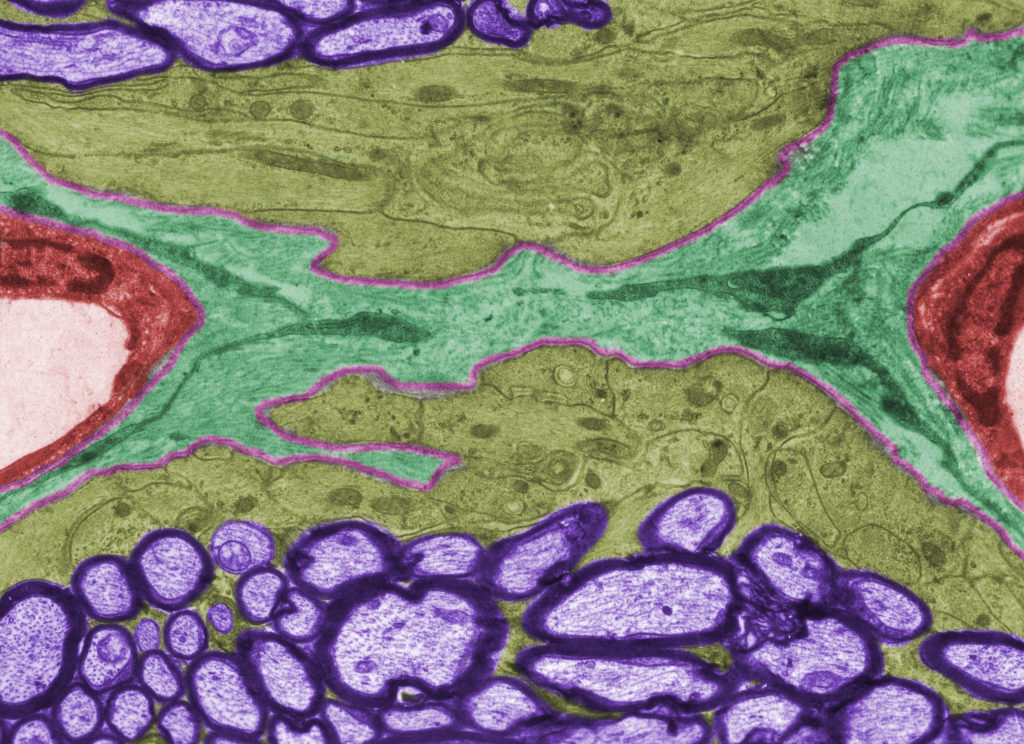Quick Hits
Daily brief research updates from the cognitive sciences

This sounds pretty gruesome – your brain starting to eat itself, like some sort of disease in a horror film. However, research recently published has shown that this process, which we have known about for a long time, is important in developing memory in the short term.
But let’s understand how the brain can eat itself in the first place. There are a number of ways the brain, or rather specific cells in the brain and most of these are good for the brain, digest parts. Firstly, we know that as the brain develops in early childhood there is a key phase of so-called pruning. This is when the brain, or specifically a form of helping cell in the brain called glial cells, cut back connections in the brain. This helps make our brains more efficient and stabilises certain memories and functions.
There are also other processes, and these are often part of everyday cleaning processes whereby a type of glial cell will clear out toxins collected in the brain – and then there is a process whereby damaged cells are cleared out. If the brain does this overenthusiastically, for example after stroke, this can inhibit brain functions.
This we know, but we didn’t know how this works in a day-to-day basis and how this helps plasticity, our brain to develop and learn new things, and therefore memory.
This is where Yosuke M. Morizawa and colleagues at Tohoku University in Japan managed to discover more. They focused on what are called Bergmann Glial Cells and managed to image these as they were “nibbling” on synapses, connections, between neurons.
What was interesting is that when the researchers managed to genetically inhibit this process the learning in mice was blocked. This therefore shows that those cells, by eating away at our brain connections after a learning process, enhance learning.
Therefore, this eating away at our synapses, likely clears out toxins but also improves efficiency of processing and therefore helps us learn more.
So, there you have it your brain eats itself to stay more efficient – but only in a small way, thankfully.

Andy Habermacher
Andy is author of leading brains Review, Neuroleadership, and multiple other books. He has been intensively involved in writing and research into neuroleadership and is considered one of Europe’s leading experts. He is also a well-known public speaker, speaking on the brain and human behaviour.
Andy is also a masters athlete (middle distance running) and competes regularly at international competitions (and holds a few national records in his age category).
References
Yosuke M. Morizawa, Mami Matsumoto, Yuka Nakashima, Narumi Endo, Tomomi Aida, Hiroshi Ishikane, Kaoru Beppu, Satoru Moritoh, Hitoshi Inada, Noriko Osumi, Eiji Shigetomi, Schuichi Koizumi, Guang Yang, Hirokazu Hirai, Kohichi Tanaka, Kenji F. Tanaka, Nobuhiko Ohno, Yugo Fukazawa, Ko Matsui.
Synaptic pruning through glial synapse engulfment upon motor learning.
Nature Neuroscience, 2022
DOI: 10.1038/s41593-022-01184-5
More Quick Hits
Being “Hangry” Really Is A Thing
Quick HitsDaily brief research updates from the cognitive sciences o, scientists have now proven that being “hangry” is real thing. What took them so long? Well, first of all things which seem intuitively right such as the weather making pain worse...
Reward Drives Aggressive Behaviour Against “Others”
Quick HitsDaily brief research updates from the cognitive sciences s vs. them is known as in-groups vs. out-groups in psychology. This is the well-known effect of people being loyal to their own groups and being competitive and often aggressive to...
Low Oxygen Impairs Decision-Making
Quick HitsDaily brief research updates from the cognitive sciences ast year I reported on how pollution and bad air in offices correlates with lower performance and productivity. Something business should take note of. A study out of the University...
The Brain Waves That Drive Social Behaviour
Quick HitsDaily brief research updates from the cognitive sciences have reported in other places on the social regions of the brain (for review see here). And this has indeed been the standard approach – try to identify the specific regions in the...
Being Mindful Improves Relationships With Co-Workers
Quick HitsDaily brief research updates from the cognitive sciences he topic of mindfulness has been a hot topic for a number of years now. This is not to be confused with meditation which is often lumped together with mindfulness – because they do...
Engaging Leadership Boosts Employee Engagement, and Team Effectiveness, and Resilience
Quick HitsDaily brief research updates from the cognitive sciences paper just out has looked again at leadership style and impacts on employee engagement and also various team effectiveness measures. Greta Mazzetti of the University of Bologna,...






